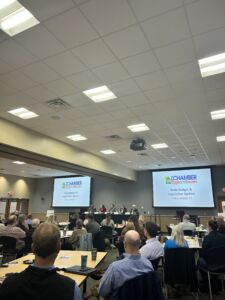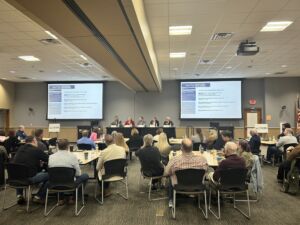Eggs & Issues: State Budget and Legislative Update
October 21, 2025
Bipartisan Support: Housing, Transportation, Child-Care
The Chamber's October 21st issue of Eggs & Issues focused on the state budget and a legislative update directly from representatives. Senator Romaine Quinn, a Republican from Birchwood representing District 25, joined the panel along with Assembly Representative Jodi Emerson, a Democrat from Eau Claire representing District 91. John Jacobson, Director of Public Affairs for Ruder Ware Law Firm and a registered lobbyist who advocates on behalf of clients interests with policymakers, also joined the panel.
The 2025 Chippewa Valley Rally was held on April 22nd in the midst of budget negotiations. The Chippewa Valley Rally is an annual event organized by the Chamber where business members of the Chippewa Valley Region travel down to Capitol and meet with legislators to discuss popular issues. In July, the state budget was finalized, including compromises on several big issues. All local Republicans voted yes for the budget, local Democrats Senator Jeff Smith and Representative Jodi Emerson voted yes, while Representative Christian Phelps voted no.
Perspectives on the budget compromise and bipartisan action
Rep. Emerson, in her fourth assembly term, says that one thing she hears consistently from many of her constituents is, "We want you to work together, stop fighting in Madison all the time and work for us". This is part of what got her to vote yes for the budget. "This is the first time in my four sessions where Democrats and Republicans, and the Governor's office really all sat down together and really hammered out some compromises on something big like this." She said, "One of the big things that also got me across to a yes on this was the hospital assessment". This assessment put more than one billion dollars into a fund to help keep rural hospitals open, and Rep. Emerson said she could not let an opportunity like that pass. 
"The single largest investment in the budget year over year would be the investment into our Medicaid program". Sen. Quinn stressed the importance of increasing reimbursement rates for providers, providing services for those who are either not insured or under-insured, and trying to close that gap in an attempt to cool the increases seen in our insurance rates in the private sector. On the topic of education, the Senator stated that there was $500 million for raising the reimbursement rate for special education, sharing that in a lot of rural districts, when a single student moves in with very high needs, a school might have costs of $200,000 just to educate that student. "That's a big deal. So taking 90% of those costs off the table for every district in the state to try to create that parity and then get rid of that uncertainty was important as well".
John Jacobson commented, "We hear a lot about the surplus, but that's one time money, and there's a break even and the state is pretty much right at that". He said he was unsure if a budget was going to get done, but it did on a bipartisan basis and he is very proud of that. This earned him a round of applause!
Current political environment
Senator Quinn, in the middle of his first state Senate term, said the political environment depends on the issue. "There's going to be a lot of opportunity, we're going to have a lot of great bills...things in the capitol are normal". He is optimistic about the passing of bipartisan bills, even some that address housing.
Representative Emerson reflected on recent issues that have tilted the political climate and the increased feeling of uncertainty across the state by both representatives and voters. "There has been some success with doing bipartisan stuff, but you have to factor on top of that. What has been happening in the last couple of months. Nobody needs to die because of the job that they're in. That should be a bipartisan statement".
John Jacobson recommended attending the Chippewa Valley Rally to see first hand the work of representatives and the collegiality of it all. Jacobson wishes the public has his perspective, "There is a huge percentage of bills every single legislative session that are bipartisan. I'm really proud of our delegation in the Chippewa Valley because they personify what bipartisanship looks like".
Housing
Housing costs are "death by a thousand cuts," said Sen. Quinn; It isn't just building expenses, it's local regulation, zoning, and a whole "host of issues that make housing slowly unaffordable to the point where it’s not the builder’s fault…” Sen. Quinn pointed to Evers v. Marklein, a Wisconsin Supreme Court ruling holding that it is unconstitutional for a legislative committee to even temporarily block an administrative rule without enacting new legislation; for clarification, an administrative rule is a general statement of applicability created by an agency (or legislative body) to implement, interpret, or make specific a law or statute. For example, a rule could be created to clarify requirements for a government benefit program. Sen. Quinn explained that legislation is held up at the building code, having now lost their ability to move through the rules process. "We've seen that now with ACAT fees on farmers," said Sen. Quinn, "And some people might be comfortable with it right now because they like the administration. But when the administration changes, just remember, a Republican administration… looks a lot different than a Democrat administration.” 
Rep. Emerson, adding on to the rules conversation, explained that "It is important that there are some changes,” she said, “I don’t think it’s great where it's at… but it wasn’t healthy before either.” Rep. Emerson added that the current process can be slowed or stopped by one stubborn individual, and “that’s also not healthy when one person… can change how things that are happening too.”
On the topic of housing legislation, the panel also discussed the changing Residential Tax Incremental District (TID), which is an area in a community designated by the government to help finance public improvements for new (or redeveloped) housing. Rep. Emerson explained that this TID will help in building more houses; however, she noted that “the only problem… a lot of my Democrat colleagues had on there is there wasn’t any money for communities to update their comprehensive plans with it.” A comprehensive plan is a long-term guide for a community's development, covering land use, housing, and public facilities. It was Rep. Emerson’s ask to get “money into it to help these communities get their comp[rehensive] plans up to where they need it.”
Sen. Quinn explained that TID gives power to communities to continue economic growth. He notes that many "communities are either maxed out… or what they want to see in their community doesn’t match the requirements under tax increment financing:” It takes a lot of work. Sen. Quinn notes that the reason funding isn’t attached to initial bills is because it “avoids line-item vetoes” from Governor Evers. “I know the Governor doesn’t like that because he says ‘you’re trying to usurp my authority to influence,’ and it’s like, 'yeah, that's the point,’” said the Senator.
PFAS
PFAS (Per- and Polyfluoroalkyl Substances) are a combination of human-made chemicals used in products for their heat, water, grease, and oil-resistant qualities; however, concern has sparked over their "forever chemical" status, specifically how easily they can build up in the environment and people's bodies. Eau Claire (and other communities around the state) have started investing significant capital expenses to address chemicals in our drinking water. Eau Claire's previous budget set aside nearly $125 million for grants to help remedy the problem, but the money has never been spent. Sen. Quinn said, "This is the downside of doing policy and money in separate bills," and, "We've set aside 125 million dollars... and it's been sitting there for three years." For Sen. Quinn, the largest point is how to hold people accountable: "We are not going to hold people accountable who were not the original emitters of PFAS. We want to protect innocent landowners. Our only leverage is the money. How do we hold some of those farmers or other landowners harmless from that?"
Rep. Emerson called for legislation that takes into account both private and public utilities, again, finding a sticking point in accountability: “And I think that’s probably where the sticking point is, figuring out where that line is as far as accountability.” Both Rep. Emerson and Sen. Quinn stressed fair and accurate accountability and the pressing need to get issues solved as soon as possible.
Childcare & Healthcare
Rep. Emerson started the conversation, expressing her feelings on General Purpose Revenue (GPR) being used to fund childcare: "You know, I’m happy that for the first time ever, we got GPR funding to pay for childcare in this budget, but it’s not enough.” Rep. Emerson explained that the cost of raising a child continues to grow, saying "the cost of putting a child in a well-run high-quality child care facility is so critically important, but it’s so expensive. It’s more expensive than putting your kid through college right now and… you don’t get to take out a childcare loan." Although Rep. Emerson believed the bill had negatives when it came to funding childcare, after she weighed the pros and cons, she voted to pass the bill: “It’s not good enough… but we have one vote on the budget… and I had to weigh all the pluses and minuses with this.”
Sen. Quinn noted how communities do a poor job of recognizing how many mothers would like to stay home: “As we are looking to make childcare more affordable, we should also find ways to empower families who want to make that sacrifice and stay home.” Sen. Quinn called to give families the ability to make the choice which makes most sense for them, saying “...allowing families to choose, I think it’s really important for the system, and sure, it’s not enough. It’s never enough, but it was a step in the right direction…”
Panelist Jacobson finished the conversation, giving context that the starting point in the base budget for child care was zero: “Whatever you want to call it, negotiations, it started at zero, and now there are hundreds of millions of dollars. I just think that’s a win personally. From a process standpoint and a collaborative standpoint.”
For more information:
Legislators address Chippewa Valley budget priorities while protestors advocate for more childcare funding
Chamber Business Advocate Newsletter - State Budget Recap
Special Edition: Legislative Issues Update
Register for the Chamber's November Eggs & Issues: Our Energy Future on Friday, November 21, from 7:00 - 8:30 a.m here
Register now for the 32nd annual Chippewa Valley Rally here
Posted by Gigi Galdamez & Brennen Bolopue, Governmental Affairs Interns
galdamez@eauclairechamber.org, bolopue@eauclairechamber.org